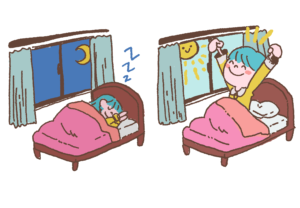
We’ve all had those days where nothing can save us from that dreaded midday slump. Not coffee, nicotine and especially not your monotone chemistry professor trying to convince you that amino acids are exciting.
This is where the art of napping comes in. If executed correctly, a nap can rid you of your exhaustion and leave you feeling energetic and refreshed. However, from conversations I’ve had with friends, naps are quite a divisive topic. Some people find them to be a quick break from constant stimulation, whereas other people seem to have a problem with the groggy, disorienting feeling after waking up from one.
According to a Harvard University study, napping is a science. By following the right routine, you can eventually perfect your sleep hygiene. However, the most common mistake people make when napping is sleeping for more than 30 minutes, which leads to sleep inertia or that drowsy feeling. In addition, taking longer naps can disrupt your natural circadian rhythm and lead to obesity or high blood pressure.
However, when executed correctly, naps can temporarily boost your energy. Ideally, naps should be between 10 to 30 minutes long, and you should aim for early afternoons from around 1 p.m. to 3 p.m. to optimize your sleep. For light sleepers like myself, this can be difficult to achieve, so here are a few tips for falling asleep faster and why naps can be extremely valuable.
Breathing techniques such as the 4-7-8 military exercise are highly regarded as efficient ways to get past that initial barrier of consciousness. Also, circulating on TikTok is the concept of coffee naps, which involves drinking coffee before napping for 20 minutes. Though this technique sounds counterintuitive, research has found that taking a quick nap clears adenosine receptors allowing caffeine to fit into them and boost alertness.
Being in a nice environment is also crucial to falling asleep quickly. My favorite nap spots on campus include the wooden cubicles located on the first floor of Orbach. If you find the boisterous friend groups too distracting, the Commuter and Student Lounge on the third floor of the Highlander Union Building (HUB) provides a quiet, comfortable place to catch up on rest.
If you feel too self-conscious about sleeping in public, try catching a quick snooze on the Scotty Statue’s lap right by the University of California, Riverside (UCR) sign. There truly is no better place for a peaceful nap than under his watchful and protective gaze.
But, if you’re wondering why you should spend your time napping to stay alert when you could pick up a frappuccino from Coffee Bean, here’s another incentive: Napping can expand your brain size.
Well, “expanding your brain” is technically a myth. There isn’t anything you can do to physically increase the size of your brain, but there are methods to preserve your brain mass, including taking naps.
For instance, a United Kingdom Biobank study found that people who nap regularly have about 0.9 cubic centimeters more brain volume than people who don’t nap. Brain volume naturally shrinks with stress related disorders, disease and age. However, naps are powerful tools linked to reducing high cortisol levels and slowing the degradation of brain matter.
These perks are valuable, but long-term benefits are only evident with consistent use. Nevertheless, napping can provide short-term benefits as well, including a period of mental clarity that can last upwards of three hours.
While napping is a great tool for boosting your alertness and mental clarity, it is important to know that’s all it is. Students are especially notorious for having odd circadian rhythms, and part of the reason is due to misusing naps. Though naps provide you with a temporary boost, getting eight hours of uninterrupted sleep is irreplaceable and essential for memory consolidation, information processing and deep tissue repair.
Much like the sugary Flintstone gummies you ate as a kid, naps are meant to supplement your nighttime sleep — not replace it.
Naps are incredibly misunderstood and, if used correctly, can be a beneficial tool for improving your sleep hygiene and overall life. Even if you aren’t a regular napper, when you feel that afternoon drowsiness, try to refrain from chugging a Celsius and close your eyes for a few minutes. You might wake up feeling better than you ever have before.


